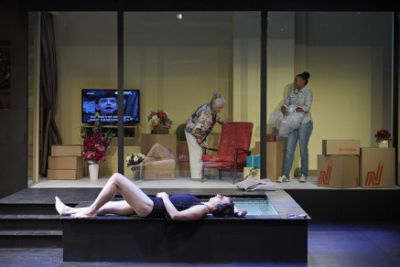Hedda Gabler
Belvoir has done it again. After the infamous rewriting and updating of classics like Death of a Salesman, The Seagull, The Inspector General, Private Lives and their much celebrated production of Wild Duck, now they turn again to Ibsen with Hedda Gabler.
Director/adapter Adena Jacobs abbreviates each scene, reworks it into modern vernacular but at least keeps its thriller narrative. Designer Dayna Morrissey has translated Hedda’s handsome new 1890’s home into a glass box townhouse (obligatory now in most Belvoir productions), complete with outdoor sauna pool and the forbidding black Jaguar once driven by Hedda’s late father.
Most radical, although interestingly less so in performance, is the idea of casting a man as Hedda. Ash Flanders is the other half of the remarkable Melbourne queer theatre Sisters Grimm; his riotous portrayal of a Hollywood Golden Age star in the STC co-production of Little Mercy was a balanced act of high camp with surprising pathos.
 Here as Hedda, Flanders is more restrained within a suburban entrapment, stranded into a one-dimensional performance of bored angst. While the production maintains interest with its artful reinvention, the mysteries and contradictions of the deadly romantic Hedda are mostly steamrolled away, as are the complexities between the characters.
Here as Hedda, Flanders is more restrained within a suburban entrapment, stranded into a one-dimensional performance of bored angst. While the production maintains interest with its artful reinvention, the mysteries and contradictions of the deadly romantic Hedda are mostly steamrolled away, as are the complexities between the characters.
Marcus Graham oozes manipulative charm as a bisexual Judge Brack and Lynette Curran is splendid as the nauseously domestic Aunt Julie. Oscar Redding is effective as the truly romantic figure of Lovborg, whose life and genius new book Hedda sharpens her claws over like a frustrated feline. Anna Houston, terrified of Hedda since childhood, plays his dedicated assistant. And Tim Walter plays Hedda’s ordinary new husband as a constant reminder of her life’s cautious compromises. Branden Christine struggles to fill in the holes as servant Berte.
In the middle is the cold and moody Flanders, adding a male aggression to Hedda’s feministic frustrations, and perhaps a queer petulance. It’s a cartoon of comment, but Jacob’s production, laboured with long empty breaks between cursory interactions, leaves you caring little for any of it – except the original.
Martin Portus
Images: Ellis Parrinder
Subscribe to our E-Newsletter, buy our latest print edition or find a Performing Arts book at Book Nook.

